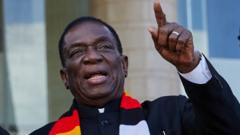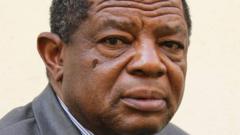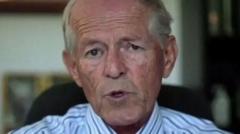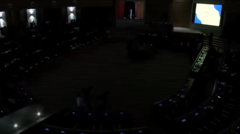The recent move by President Emmerson Mnangagwa, mandating a radio licence fee for motorists, sparks outrage among citizens amid economic struggles.
President Mnangagwa Signs Controversial Radio Levy Bill for Motorists

President Mnangagwa Signs Controversial Radio Levy Bill for Motorists
Zimbabwe's new radio levy mandatory for vehicle insurance faces backlash from the public.
In a controversial decision, Zimbabwe's President Emmerson Mnangagwa has enacted a bill requiring all vehicle owners to purchase a radio licence before they can acquire insurance for their cars. This new legislation, which mandates an annual fee of $92 (£68), has incited significant anger and frustration among motorists already grappling with economic challenges. Government officials assert the initiative is designed to enhance revenue for the struggling state broadcaster, the Zimbabwe Broadcasting Corporation (ZBC), but critics argue the fee is exorbitant and represents a regressive tax on the population.
Leading the opposition against the new law, Nelson Chamisa condemned it as "draconian, anti-citizens, and outrightly heartless." In a bid to address concerns raised on social media, Nick Mangwana, an official in the Ministry of Information, defended the law as “necessary” and “fair”. Current statistics indicate that Zimbabwe has about 1.2 million registered vehicles, although only 800,000 of them are insured, showcasing a significant gap that the government hopes to address through this levy.
The ZBC, which heavily relies on both the radio licence fees and government support, faces an uphill battle in attracting compliance, with many criticizing their perceived bias favoring the ruling Zanu-PF party. Under the new regulation, motorists must demonstrate proof of a valid radio licence to renew their vehicle insurance or receive a licence from the Zimbabwe National Road Authority (Zinara). Although exceptions can be made for tourists and specific circumstances, the amendment is intended to close existing loopholes and enhance compliance.
Opposition critics and citizens have taken to social media to voice their discontent, labeling the levy as a burden that exacerbates financial struggles during these challenging economic times. One user lamented the relentless "pauperization" of the citizenry under current leadership, underscoring the rising tension and frustration surrounding this new enforcement amidst Zimbabwe's tumultuous political and economic climate.
Leading the opposition against the new law, Nelson Chamisa condemned it as "draconian, anti-citizens, and outrightly heartless." In a bid to address concerns raised on social media, Nick Mangwana, an official in the Ministry of Information, defended the law as “necessary” and “fair”. Current statistics indicate that Zimbabwe has about 1.2 million registered vehicles, although only 800,000 of them are insured, showcasing a significant gap that the government hopes to address through this levy.
The ZBC, which heavily relies on both the radio licence fees and government support, faces an uphill battle in attracting compliance, with many criticizing their perceived bias favoring the ruling Zanu-PF party. Under the new regulation, motorists must demonstrate proof of a valid radio licence to renew their vehicle insurance or receive a licence from the Zimbabwe National Road Authority (Zinara). Although exceptions can be made for tourists and specific circumstances, the amendment is intended to close existing loopholes and enhance compliance.
Opposition critics and citizens have taken to social media to voice their discontent, labeling the levy as a burden that exacerbates financial struggles during these challenging economic times. One user lamented the relentless "pauperization" of the citizenry under current leadership, underscoring the rising tension and frustration surrounding this new enforcement amidst Zimbabwe's tumultuous political and economic climate.

















